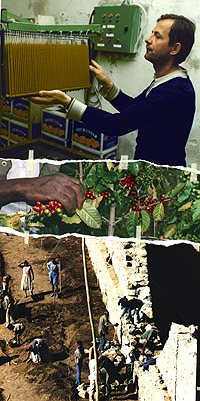
Moving clockwise from top left corner, the images are 1: Albania, 1993: Candle-making workshop in Berat; 2: Ethiopia, 1994: A farmer amid the coffee trees which provide his family with cash income; 3: Eritrea, 1994: For payment in food, the local population provides the workforce for the construction of a new dam (Photos: Peter Williams/WCC).
People
Through the 1960s the idea grew that diaconal service should extend beyond charitable initiatives for relief to projects and programmes of economic and social development.
Serious challenges would later arise to the optimism and many of the assumptions about development of this period. But the insistence on promoting justice has remained central to the WCC's message and mission.
This motivation appears clearly in the words of the section report on World Economic and Social Development at the Uppsala assembly in 1968:
in need:
our
neighbours
Ecumenical inter-church aid began with mobilizing the resources of churches to relieve the suffering of communities stricken by emergencies -- famine and drought, storms and floods, fires and earthquakes, war and civil strife. The WCC's role was to channel donations of money and material aid ecumenically, to ensure that assistance went to those most in need, without regard for their church affiliation.
The political and economic structures groan under the burden of grave injustice, but we do not despair, because we know that we are not in the grip of blind fate. In Christ God entered our world with all its structures and has already won the victory over all the "principalities and powers". We now live in a world in which people in need in all parts of the world are our neighbours for whom we bear responsibility. Christians should be in the forefront of the battle to create a sense of participation in a worldwide responsible society with justice for all.